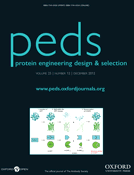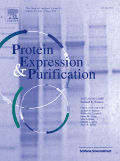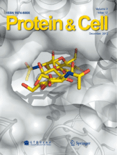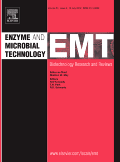
PROTEIN ENGINEERING DESIGN & SELECTION
Scope & Guideline
Bridging Theory and Practice in Biochemical Research
Introduction
Aims and Scopes
- Protein Design and Engineering:
The journal emphasizes novel methodologies for designing proteins, including computational approaches, directed evolution, and rational design. This includes the engineering of enzymes and antibodies to enhance their activity, stability, and specificity. - Computational Methods and Modeling:
A significant focus is placed on computational tools and algorithms that facilitate protein design, such as machine learning, deep learning, and physics-based simulations. These methods are crucial for predicting protein interactions and optimizing structural features. - Functional Characterization and Screening:
Research published in the journal often involves functional assays and screening techniques for evaluating engineered proteins. This includes high-throughput methods for identifying active variants and assessing their properties in biological systems. - Biotechnology and Therapeutic Applications:
The journal covers applications of engineered proteins in biotechnology and medicine, including the development of therapeutics, biosensors, and biocatalysts. This reflects a strong emphasis on translational research that bridges basic science with practical applications. - Sustainable and Green Chemistry:
There is an increasing interest in engineering proteins for sustainable applications, such as biodegradation and bioconversion processes, which contribute to environmental sustainability and resource efficiency.
Trending and Emerging
- Integration of Machine Learning in Protein Engineering:
Recent publications emphasize the use of machine learning and deep learning techniques for protein design and optimization. This trend is significant as it allows for more efficient predictions of protein interactions and functionalities, revolutionizing the design process. - Focus on Multi-specificity and Bispecific Antibodies:
There is a growing interest in the engineering of multi-specific and bispecific antibodies, which are crucial for developing advanced therapeutic strategies. This trend reflects an increased demand for versatile therapeutic agents that can target multiple pathways. - Sustainable Biocatalysis and Green Chemistry:
Research addressing the development of enzymes for sustainable applications, such as biodegradation and biocatalysis in green chemistry, is emerging as a key theme. This aligns with global sustainability goals and the need for environmentally friendly solutions. - Enhanced Functional Characterization Techniques:
Emerging methods for functional characterization, including high-throughput screening and novel assay platforms, are increasingly featured in the journal. This trend is critical for rapidly assessing the performance of engineered proteins in diverse applications. - Applications in Synthetic Biology:
There is an upward trend in research that applies protein engineering principles to synthetic biology, including the design of novel biosynthetic pathways. This reflects an interdisciplinary approach that combines protein engineering with genetic and metabolic engineering.
Declining or Waning
- Traditional Methods of Protein Engineering:
There has been a noticeable decrease in publications focusing solely on classical methods of protein engineering, such as simple mutagenesis and standard biochemical assays. The field has increasingly shifted towards more sophisticated and computationally driven approaches. - General Enzyme Redesign without Specificity:
Publications that broadly discuss enzyme redesign without targeted enhancements for specific applications or functions appear to be waning. This indicates a trend towards more specialized studies aimed at particular industrial or therapeutic goals. - Basic Structural Biology Studies:
Research focused primarily on the structural biology of proteins, without direct implications for engineering or design, has become less frequent. The journal seems to favor studies that integrate structural insights with practical design applications.
Similar Journals

PROTEIN EXPRESSION AND PURIFICATION
Pioneering Insights in Biochemistry and Molecular BiologyPROTEIN EXPRESSION AND PURIFICATION, published by Academic Press Inc. Elsevier Science, is a premier journal in the field of biotechnology. With its ISSN 1046-5928 and E-ISSN 1096-0279, the journal has been a vital source of knowledge since its inception in 1990 and continues to provide high-quality research up to 2025. Though categorized in the third quartile (Q3) for 2023 within its scope of biochemistry, genetics, and molecular biology, it serves as a valuable platform for scientists and researchers focusing on the latest advancements in protein expression methodologies and purification techniques. The journal enjoys a respectable Scopus rank of 177 out of 311 in its category, representing a 43rd percentile position that underscores its impact in the research community. While not an Open Access journal, it offers a wealth of insights that can significantly enhance one's understanding of protein biochemistry, making it a must-read for professionals and students alike engaged in this dynamic field.

Biomolecules
Connecting researchers to the forefront of biomolecular science.Biomolecules is a prestigious, peer-reviewed journal published by MDPI that has been dedicated to advancing the field of biochemical research since its launch in 2011. With an impressive impact factor positioning it in Q1 for Biochemistry and Q2 for Molecular Biology as of 2023, this journal serves as a vital platform for disseminating high-quality research findings related to biological macromolecules, including proteins, nucleic acids, and carbohydrates. Operating as an Open Access journal, it ensures that vital research is accessible to all, furthering knowledge dissemination and collaboration within the scientific community. Located in Basel, Switzerland, the journal has established a significant presence in major academic databases, holding commendable Scopus rankings in both Biochemistry and Molecular Biology. Researchers, professionals, and students will find Biomolecules an invaluable resource for cutting-edge research, reviews, and insights in the rapidly evolving domains of biochemistry and molecular biology.

Protein & Cell
Connecting Researchers Through Open Access InsightsProtein & Cell, published by Oxford University Press, is a distinguished international journal focusing on cutting-edge research in the fields of biochemistry, biotechnology, cell biology, and drug discovery. This open access journal, active since 2014, is dedicated to disseminating innovative findings that advance our understanding of protein functions and cellular processes, making it an essential resource for researchers, professionals, and students alike. With an impressive 2023 impact factor reflected in its Q1 ranking across multiple categories such as Biochemistry, Drug Discovery, and Cell Biology, 'Protein & Cell' stands at the forefront of scientific research, driving collaboration and discussion in the scientific community. Researchers can access the journal freely online, fostering a global exchange of knowledge and contributing to significant advancements in medicine and biotechnology. Located in the United Kingdom, the journal strives to be a pivotal platform for impactful research that influences future studies and applications.

New Biotechnology
Catalyzing Collaboration in Biotechnology ResearchNew Biotechnology, published by Elsevier, is a distinguished academic journal focused on the innovative realms of biotechnology and bioengineering. With an impact factor reflecting its strong presence in the field, this journal serves as a vital resource for researchers and professionals in the life sciences, offering insights into cutting-edge advancements and applications in biotechnology, molecular biology, and related disciplines. The journal's open access policy enhances its accessibility, allowing broad dissemination of knowledge and research findings. With a robust set of Scopus ranks placing it in the top tiers of its categories, including rank #36 in Biotechnology and #24 in Bioengineering, New Biotechnology represents a critical platform for scholars aiming to contribute to the ongoing dialogue in these rapidly evolving fields. Since its inception in 2008 and continuing through to 2024, the journal remains committed to fostering innovation and collaboration among scientists dedicated to advancing biotechnological applications, thereby significantly impacting medicine and industry.

Statistical Applications in Genetics and Molecular Biology
Exploring the Intersection of Statistics and GeneticsStatistical Applications in Genetics and Molecular Biology, published by WALTER DE GRUYTER GMBH, serves as a vital academic platform for researchers and professionals dedicated to the integration of statistical methodologies within the fields of genetics and molecular biology. Established in Germany, this interdisciplinary journal, with an ISSN of 2194-6302 and E-ISSN 1544-6115, seeks to bridge the gap between statistical theory and biological applications, making it an essential reading for those engaged in data analysis, biological research, and computational methods. Despite its current Q4 ranking in key categories such as Computational Mathematics and Genetics, the journal continues to strive for academic rigor and relevance, addressing contemporary challenges and advancements in the field. The journal encourages the submission of high-quality, peer-reviewed research that showcases innovative statistical approaches to genetic and molecular data, providing valuable insights and fostering collaboration among scientists. Exploratory or applied studies that demonstrate effective statistical applications are particularly welcomed, ensuring that both novel and established methodologies are discussed, alongside practical case studies that advance the understanding of biological phenomena. As an open-access journal, it aims to widen the accessibility of cutting-edge research, emphasizing the importance of transparency and sharing knowledge among the scientific community.

TRENDS IN BIOCHEMICAL SCIENCES
Highlighting Transformative Research in BiochemistryTRENDS IN BIOCHEMICAL SCIENCES is a premier academic journal published by CELL PRESS, focusing on the latest advancements and insights in the dynamic fields of biochemistry and molecular biology. With an ISSN of 0968-0004 and an E-ISSN of 1362-4326, this journal has established itself as a leading source of high-impact research, boasting an impressive Q1 category ranking in both Biochemistry and Molecular Biology as of 2023. The journal's Scopus Ranks further highlight its significance, placing it in the top 3% and 4% of its respective fields, emphasizing its role as a vital platform for disseminating innovative research. Published since 1976 and continuing through 2024, TRENDS IN BIOCHEMICAL SCIENCES provides a comprehensive overview of the latest trends, methods, and applications, helping researchers, professionals, and students stay at the forefront of their disciplines. Although it offers traditional access options, the journal's rich content and authoritative analysis make it a must-read for those pursuing cutting-edge biochemical research.

PROTEIN JOURNAL
Pioneering Discoveries in Biochemical ApplicationsProtein Journal, published by Springer, stands as a significant academic resource in the fields of Analytical Chemistry, Biochemistry, Bioengineering, and Organic Chemistry. Since its inception in 1996, the journal has dedicated itself to the dissemination of high-quality research focused on protein chemistry and its biomedical applications. With an impressive impact reflected in its classification as a Q2 journal in Analytical Chemistry and Q3 in both Biochemistry and Bioengineering as of 2023, it provides an essential platform for researchers and practitioners to share their findings. The journal embraces the open-access model, enhancing accessibility to cutting-edge research. The Protein Journal is crucial for academicians, industry professionals, and students, catering to their need for rigorous scientific discourse and innovative discoveries in protein studies. With an established track record of converging over two decades of knowledge and research, it continues to influence and shape the advancements in this vital area of science.

ENZYME AND MICROBIAL TECHNOLOGY
Exploring the Frontiers of Biochemical InnovationENZYME AND MICROBIAL TECHNOLOGY, a premier journal published by Elsevier Science Inc, serves as a pivotal platform for researchers and professionals dedicated to exploring the dynamic intersections of microbiology, biochemistry, and bioengineering. With a rich publication history dating back to 1979 and converging until 2024, this journal has established itself within the Q2 quartile rankings across multiple categories, including Applied Microbiology and Biotechnology, Biochemistry, Bioengineering, and Biotechnology, highlighting its influential role in advancing scientific discourse. It holds impressive Scopus rankings, where it is recognized in the 79th percentile for Applied Microbiology and Biotechnology and ranks favorably in related fields, making it a valuable resource for academic and industrial researchers looking to stay abreast of the latest developments. Although it does not currently offer Open Access options, ENZYME AND MICROBIAL TECHNOLOGY remains an essential read for anyone invested in the biotechnological applications of enzymes and microorganisms.

Current Proteomics
Exploring Innovations in Proteomic DiscoveriesCurrent Proteomics is a distinguished journal dedicated to the dynamic field of proteomics, offering researchers and professionals a platform to disseminate innovative findings and comprehensive reviews. Published by Bentham Science Publishers Ltd, this journal caters to a global audience and serves as an essential resource for students, academics, and industry experts interested in advances in biochemistry and molecular biology. With an ISSN of 1570-1646 and an E-ISSN of 1875-6247, the journal has established itself in various research categories, achieving a Q4 ranking in both Biochemistry and Molecular Biology as of 2023. While the impact factor and H-index data are not specified, its Scopus ranking reflects a competitive position in its fields, with percentiles in the 12th to 16th range. Although not an open-access journal, Current Proteomics is vital for fostering ongoing dialogue and collaboration in proteomic research, encouraging contributions that explore cutting-edge methodologies and applications. Researchers are invited to share their insights and contribute to this evolving discipline, thus enhancing the collective understanding of proteomics within the scientific community.

CRITICAL REVIEWS IN BIOCHEMISTRY AND MOLECULAR BIOLOGY
Synthesis of Cutting-edge Biochemical DiscoveriesWelcome to Critical Reviews in Biochemistry and Molecular Biology, a premier academic journal published by Taylor & Francis Ltd, dedicated to advancing the fields of biochemistry and molecular biology. With an impressive impact factor and a Q1 ranking in both Biochemistry and Molecular Biology for 2023, this journal serves as a vital resource for researchers, professionals, and students eager to engage with cutting-edge reviews and analyses that synthesize the latest developments in these dynamic areas of study. Since its inception in 1972, the journal has maintained a commitment to high-quality scholarship, providing a platform for critical discussions that accelerate the discovery and understanding of biochemical processes and molecular interactions. Although not open access, its robust editorial peer-review process ensures that published articles meet the highest standards of scientific rigor, making it a trusted source for the scientific community. As we continue to converge toward 2024, we invite you to explore the extensive array of topics and findings that have shaped contemporary biochemistry and molecular biology.